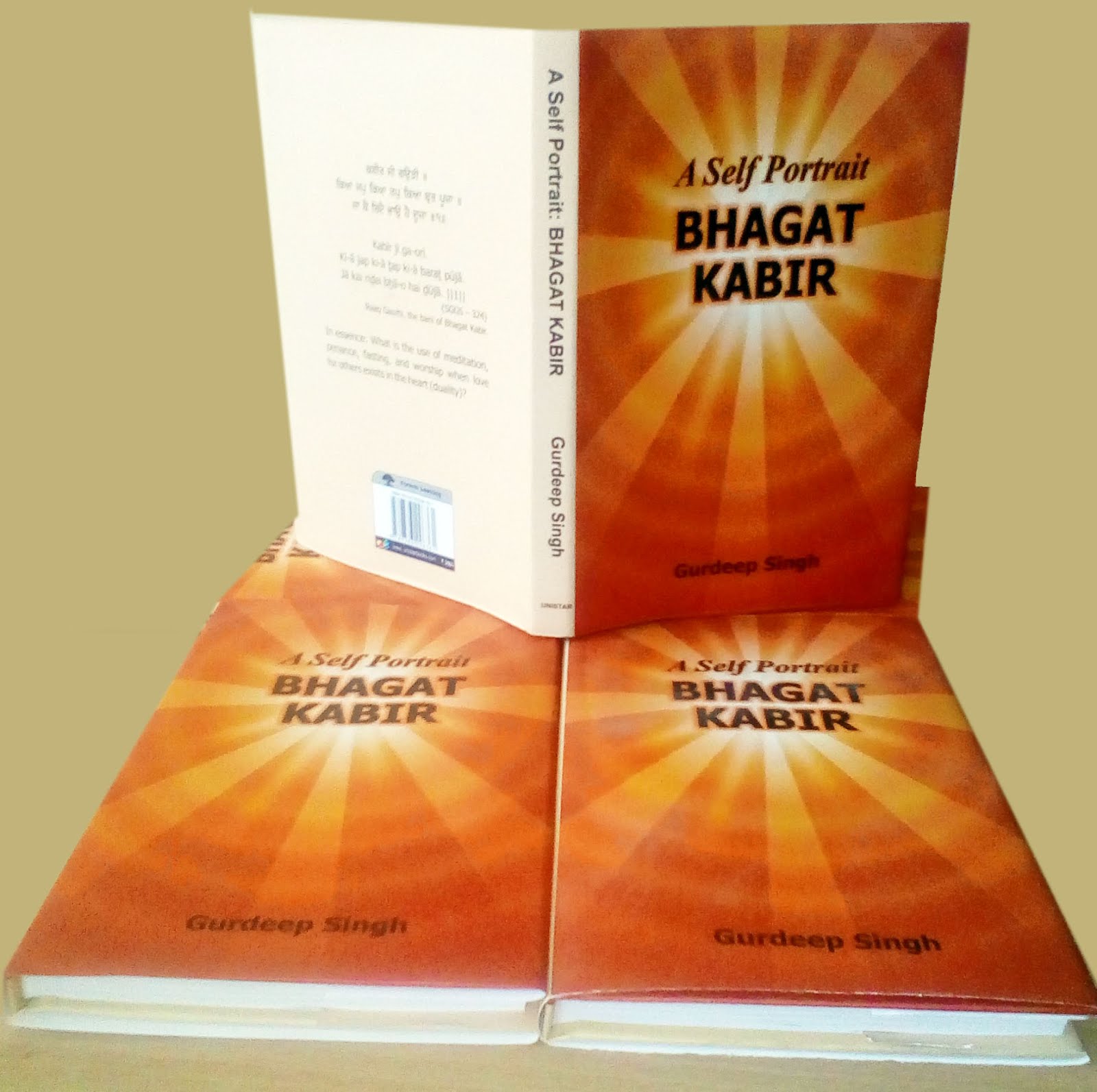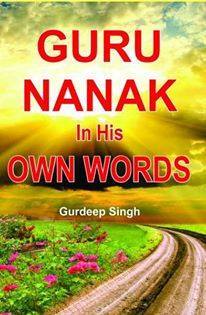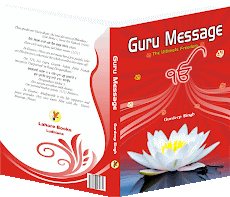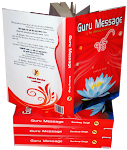20160630
The Guru Expresses A Tragedy For Our Learning
A tragedy occurs and as Guru Nanak witnesses it, he shows us a path of awareness by layering his instruction underneath the importance of the Creator’s intrinsic ordinance. His insight, which he has passed on to us through the description of the tragedy, hits the deep-rooted lust of people for pleasures. The Guru, a resolute believer of the Creator’s ordinance, reminds us how do people actually make atrocious tragedies inevitable by falling for pleasures that sow the seeds of lethargic and irresponsible behavior in them. The Guru’s observation as an eyewitness is so keen that as we read his composition, we can visualize the tragic moments in our memory.
The tragic moments became a part of Indian History of that time when the Afghans (Ibrahim Lodhi) were the rulers, and a descendant of the Turkic conqueror Timur (Tamerlane) named Babur, also known as a Mughal (Mongol), attacked western part of India hoping to establish his empire in 1526 AD. The Guru witnessed the tragic human slaughtering when he was present in Saidpur. He describes in his shabda how the Afghans took a pathetic stance by going for black magic and failing to anticipate and prepare for Babur’s invasion. As we go through it, on 417/18, SGGS, we will see his picturesque description about the fall of the Afghans that ended up in a calamity.
ਆਸਾ ਮਹਲਾ ੧ ॥
ਕਹਾ ਸੁ ਖੇਲ ਤਬੇਲਾ ਘੋੜੇ ਕਹਾ ਭੇਰੀ ਸਹਨਾਈ ॥
ਕਹਾ ਸੁ ਤੇਗਬੰਦ ਗਾਡੇਰੜਿ ਕਹਾ ਸੁ ਲਾਲ ਕਵਾਈ ॥
ਕਹਾ ਸੁ ਆਰਸੀਆ ਮੁਹ ਬੰਕੇ ਐਥੈ ਦਿਸਹਿ ਨਾਹੀ ॥੧॥
Āsā mėhlā 1.
Kahā so kẖel ṯabelā gẖoṛe kahā bẖerī sėhnā-ī.
Kahā so ṯegbanḏ gāderaṛ kahā so lāl kavā-ī.
Kahā so ārsī-ā muh banke aithai ḏisėh nāhī. ||1||
Raag Asa, the bani of First Nanak.
In essence: Where are those stables, sports of horses, and the sounds of drums and bugles? Where are those woolen sword-belts and red uniforms? Where are those mirrors in which beautiful faces were seen? They are not seen here in Saidpur.
Looking at the destruction, the Guru tells us how once beautiful palaces with influential looks and its residents living a luxurious way of life were ruined. They were all vanished because of Babur’s brutal attack. Then he reminds the power of Ekankar, who creates and destroys. Turning to the Creator, he accepts His will humbly:
ਇਹੁ ਜਗੁ ਤੇਰਾ ਤੂ ਗੋਸਾਈ ॥
ਏਕ ਘੜੀ ਮਹਿ ਥਾਪਿ ਉਥਾਪੇ ਜਰੁ ਵੰਡਿ ਦੇਵੈ ਭਾਂਈ ॥੧॥ ਰਹਾਉ ॥
Ih jag ṯerā ṯū gosā-ī.
Ėk gẖaṛī mėh thāp uthāpe jar vand ḏevai bẖāʼn-ī. ||1|| Rahā-o.
Oh Ekankar! This world is yours and you are its Master. In a moment, you create and destroy it, and in a moment, you distribute the wealth (gathered) among others. Pause.
ਕਹਾਂ ਸੁ ਘਰ ਦਰ ਮੰਡਪ ਮਹਲਾ ਕਹਾ ਸੁ ਬੰਕ ਸਰਾਈ ॥
ਕਹਾਂ ਸੁ ਸੇਜ ਸੁਖਾਲੀ ਕਾਮਣਿ ਜਿਸੁ ਵੇਖਿ ਨੀਦ ਨ ਪਾਈ ॥
ਕਹਾ ਸੁ ਪਾਨ ਤੰਬੋਲੀ ਹਰਮਾ ਹੋਈਆ ਛਾਈ ਮਾਈ ॥੨॥
Kahāʼn so gẖar ḏar mandap mėhlā kahā so bank sarā-ī.
Kahāʼn so sej sukẖālī kāmaṇ jis vekẖ nīḏ na pā-ī.
Kahā so pān ṯambolī harmā ho-ī-ā cẖẖā-ī mā-ī. ||2||
Where are those houses, palaces, tents, and beautiful caravansaries? Where is that comfortable coach along with a beautiful woman by seeing whom it was hard to go to sleep? Where are the betel-leaves and betel-leaves sellers? They are vanished like a shadow.
We can see through his words how an established city with well-known buildings, beautiful people, and powerful rulers met their end in a terrorizing and cruelty driven looting spree. A complete lively scene was converted into a full-scale destruction.
ਇਸੁ ਜਰ ਕਾਰਣਿ ਘਣੀ ਵਿਗੁਤੀ ਇਨਿ ਜਰ ਘਣੀ ਖੁਆਈ ॥
ਪਾਪਾ ਬਾਝਹੁ ਹੋਵੈ ਨਾਹੀ ਮੁਇਆ ਸਾਥਿ ਨ ਜਾਈ ॥
ਜਿਸ ਨੋ ਆਪਿ ਖੁਆਏ ਕਰਤਾ ਖੁਸਿ ਲਏ ਚੰਗਿਆਈ ॥੩॥
Is jar kāraṇ gẖaṇī viguṯī in jar gẖaṇī kẖu-ā-ī.
Pāpā bājẖahu hovai nāhī mu-i-ā sāth na jā-ī.
Jis no āp kẖu-ā-e karṯā kẖus la-e cẖangi-ā-ī. ||3||
Because of this wealth, the world goes bad; this wealth becomes a cause of disgrace. It is not gathered without sins, but the irony of this is that it doesn’t go with the mortals as they depart from here. The Creator takes away the virtues of that person to whom He causes to go astray.
The Guru deems the purpose of this destruction as petty and insignificant. It was like whirl wind that leaves nothing behind deeming itself as purposeless; however, those who become its victims fail because of their irresponsible behavior:
The shabda continues on page 417-418
ਕੋਟੀ ਹੂ ਪੀਰ ਵਰਜਿ ਰਹਾਏ ਜਾ ਮੀਰੁ ਸੁਣਿਆ ਧਾਇਆ ॥
ਥਾਨ ਮੁਕਾਮ ਜਲੇ ਬਿਜ ਮੰਦਰ ਮੁਛਿ ਮੁਛਿ ਕੁਇਰ ਰੁਲਾਇਆ ॥
ਕੋਈ ਮੁਗਲੁ ਨ ਹੋਆ ਅੰਧਾ ਕਿਨੈ ਨ ਪਰਚਾ ਲਾਇਆ ॥੪॥
Kotī hū pīr varaj rahā-e jā mīr suṇi-ā ḏẖā-i-ā.
Thān mukām jale bij manḏar mucẖẖ mucẖẖ ku-ir rulā-i-ā.
Ko-ī mugal na ho-ā anḏẖā kinai na parcẖā lā-i-ā. ||4||
On hearing of the invasion of Mir Babur, Pathan rulers summoned religious leaders to halt him with magic tricks, but all their strongly built places and mansions were burnt down and the princes were cut into pieces. Because of the magic, no Mughal got blinded (as the men of miracle claimed) and no miracle occurred (in this regard).
What did the Afghan rulers do? They took refuge in the miracles of Peers instead of realizing their due duty beforehand. Black magic was placed in force. Their acts were pitiable and laughable. The History of India was changed once for all, because they didn’t remain aware of any outside threat. Tenth Nanak obviously was inspired by First Nanak to create Khalsa so that the followers could also learn how to face any cruel suppression like this without giving in helplessly.
ਮੁਗਲ ਪਠਾਣਾ ਭਈ ਲੜਾਈ ਰਣ ਮਹਿ ਤੇਗ ਵਗਾਈ ॥
ਓਨ੍ਹ੍ਹਹੀ ਤੁਪਕ ਤਾਣਿ ਚਲਾਈ ਓਨ੍ਹ੍ਹਹੀ ਹਸਤਿ ਚਿੜਾਈ ॥
ਜਿਨ੍ਹ੍ਹਹ ਕੀ ਚੀਰੀ ਦਰਗਹ ਪਾਟੀ ਤਿਨ੍ਹ੍ਹਹਾ ਮਰਣਾ ਭਾਈ ॥੫॥
Mugal paṯẖāṇā bẖa-ī laṛā-ī raṇ mėh ṯeg vagā-ī.
Onĥī ṯupak ṯāṇ cẖalā-ī onĥī hasaṯ cẖiṛā-ī.
Jinĥ kī cẖīrī ḏargėh pātī ṯinĥā marṇā bẖā-ī. ||5||
A battle raged between the Mugals and the Pathanas and both sides clashed their swords in the battle. The Mugals aimed and fired their guns and the Pathanas attacked with elephants. Oh my brother! They who are destined to die must die.
A picture of the battle is expressed showing relentless fighting of the both sides. As we face the storm, we do our best, but because of our unpreparedness, we often fail in negating its destructive force. In the same, Afghans’ defeat swallowed them even though they put up a big fight.
ਇਕ ਹਿੰਦਵਾਣੀ ਅਵਰ ਤੁਰਕਾਣੀ ਭਟਿਆਣੀ ਠਕੁਰਾਣੀ ॥
ਇਕਨਹ੍ਹ੍ਹਾ ਪੇਰਣ ਸਿਰ ਖੁਰ ਪਾਟੇ ਇਕਨ੍ਹ੍ਹਹਾ ਵਾਸੁ ਮਸਾਣੀ ॥
ਜਿਨ੍ਹ੍ਹਹ ਕੇ ਬੰਕੇ ਘਰੀ ਨ ਆਇਆ ਤਿਨ੍ਹ੍ਹਹ ਕਿਉ ਰੈਣਿ ਵਿਹਾਣੀ ॥੬॥
Ik hinḏvāṇī avar ṯurkāṇī bẖati-āṇī ṯẖakurāṇī.
Iknĥā peraṇ sir kẖur pāte iknĥā vās masāṇī.
Jinĥ ke banke gẖarī na ā-i-ā ṯinĥ ki-o raiṇ vihāṇī. ||6||
There were the Hindu women and the Muslim women; the robes of some of them were torn from head to feet and some were killed. How those women whose handsome husbands didn’t return home would have spent their night?
ਆਪੇ ਕਰੇ ਕਰਾਏ ਕਰਤਾ ਕਿਸ ਨੋ ਆਖਿ ਸੁਣਾਈਐ ॥
ਦੁਖੁ ਸੁਖੁ ਤੇਰੈ ਭਾਣੈ ਹੋਵੈ ਕਿਸ ਥੈ ਜਾਇ ਰੂਆਈਐ ॥
ਹੁਕਮੀ ਹੁਕਮਿ ਚਲਾਏ ਵਿਗਸੈ ਨਾਨਕ ਲਿਖਿਆ ਪਾਈਐ ॥੭॥੧੨॥
Āpe kare karā-e karṯā kis no ākẖ suṇā-ī-ai.
Ḏukẖ sukẖ ṯerai bẖāṇai hovai kis thai jā-e rū-ā-ī-ai.
Hukmī hukam cẖalā-e vigsai Nānak likẖi-ā pā-ī-ai. ||7||12||
Only the Creator does all and causes others to act; to whom this tragic story can be told? Oh Akalpurakh! All pains and comforts come as per your ordinance and there is none before whom one can go and cry about it. Oh Nanak! The mortals obtain for what they are destined; Akalpurakh runs the world as per His “will” and He is pleased with it.
The Guru expresses the environment created by the Babur’s attack, which was filled with negativity. His insight makes us think why ever no lesson was learned even after that? Why positivity has been struggling with negativity over centuries to date? The answer is the same: the duality littered in unawareness plays a vital role to take away one’s virtues. It divides people; it leads to pleasurable pursuits, and it pushes a sense of responsibility to the back of one’s priorities. What ever is the time, or place, or situation, a sense of responsibility should always be kept glowing. The Sikh Gurus introduced to the Sikhs a sense of responsibility well above the selfishness and discrimination. Sixth Nanak first time taught the Sikhs how to take on the lawlessness and to survive it. One cannot practice one’s faith if one remains unaware of the negative environments brewing around, because the threat of “being eliminated” remains unchecked. Tenth Nanak completes the job to take over the responsibility of keeping the freedom intact at all cost; however, in this approach if selfishness and discrimination gain the ground, heart piercing tragedies can become inevitable. First Nanak condenses his instruction in the following line of this shabda:
ਜਿਸ ਨੋ ਆਪਿ ਖੁਆਏ ਕਰਤਾ ਖੁਸਿ ਲਏ ਚੰਗਿਆਈ ॥੩॥
Jis no āp kẖu-ā-e karṯā kẖus la-e cẖangi-ā-ī. ||3||
If one remains ardently aware of the consequences of losing one’s virtues, one never let it happen at any cost. Tragedy after tragedy occurred in the History, but no efforts were done to negate its origin. This is the way, we faulted in the past, and if we don’t foresee its possibility occurring in the future, how can we blame our Creator, who has blessed us with so much intellect and virtues. Let us understand it with a lesson. The clouds start gathering and overcasting the sky; the cool winds start signaling toward heavy and torrential rain and even then if we don’t bring in our scattered things all over outside, the would be result becomes crystal clear. The ordinance of the Creator drags us sometimes into dangerous water if we remain unaware of it. A well set up stage of nature is before us for our learning; therefore, it is our duty to learn from it and to foresee what is hidden in the future. The Creator has blessed us with keen intellect and boundless sources; we should utilize them wisely. The Guru has expressed the Saidpur tragedy for us to learn from it in such a detail that we must not ignore it. If we do, we will be considered very unfortunate.
Wishes
Gurdeep Singh
Labels:
GURMAT VICHAR
20160606
The Guru’s Gift Of Eternal Bliss
According to the Gurbani, we have two ways to live in this world. One is to live as the world does by being enveloped in the crowd mentality. The second one is to live strictly by following the Guru, who has realized the Creator. The First way is easier and it is loaded with the worldly pleasures and establishments obtained through all means save for keeping name reputation intact through high gravity of hypocrisy; on it, the most of the sectarian, religious and social exploiters feed on. A belief is set up in the public to cover up lies, bribery, exploitation, and massacres. The world educates the mortals to tread on its path on every stage of their lives through embracing tactics of exploiting others through forceful or manipulating options. It invites openly those opportunities that give the exploiters many chances of materializing the aimed materialistic goals through a justified abuse based on brainwashing techniques, which possibly could also incite bigotry and killing of others in the name of a religion or a country. Most of the time, self claimed saints of politics or religious leaders remain very active participants of this disgusting game. Unfortunately there is no end of this game in which every thing goes. Ironically the exploiters spend their lives never ever feeling guilty or content, and even till their death time, their many unfinished tasks of misusing others remain unfinished; nonetheless, the world glorifies only this way of life. It rewards its participants and throws decrees of punishments on those, who go against its well-planned avalanche of human manipulation. And, those who follow it blindly without thinking ever about its unfairness, become its distinguished part.
Surprisingly, the second way to live, according to the Gurbani, deems the worldly game of establishment as an insignificant objective totally. It only promises the seekers to enjoy never ending bliss, which is obtained by following the Guru, who through his enlightenment, guides them to look at those factors that create worry-free and bond free life set in a permanent state of mind that exhibits the presence of the Creator in and out; he further educates the seekers that the entire world is a family of the Creator, who remains present in the lives or the lifeless things equally. He also convinces that actually there is none out there but the Creator who has saturated His presence everywhere. For a rational mind, it may appear like a hallucination; however, one who materializes the divine experience, feels pity for such a rational mind. Many intellectuals and thinkers have tried to express this divine experience and set up some rules and physical exercises, but Guru Nanak has made it easier by advising the seekers just to fall in love with the Creator in a way that He should be also felt within and in His creation and beyond without a shred of any doubt. As one progresses on this path, one’s once binding negative powers start weakening and also one’s mind settles within to realize that the Creator’s power not only exists in all but also glows everywhere. All the Sikhs are advised to choose the second way though it needs a systematic battling within against the five negative forces also named as lust, anger, attachment, greed, and self-conceit.
On 142, SGGS, Guru Nanak talks about those two ways to live; please go through his own words:
ਪਵੜੀ ॥
ਬਦਫੈਲੀ ਗੈਬਾਨਾ ਖਸਮੁ ਨ ਜਾਣਈ ॥ ਸੋ ਕਹੀਐ ਦੇਵਾਨਾ ਆਪੁ ਨ ਪਛਾਣਈ ॥
ਕਲਹਿ ਬੁਰੀ ਸੰਸਾਰਿ ਵਾਦੇ ਖਪੀਐ ॥ ਵਿਣੁ ਨਾਵੈ ਵੇਕਾਰਿ ਭਰਮੇ ਪਚੀਐ ॥
ਰਾਹ ਦੋਵੈ ਇਕੁ ਜਾਣੈ ਸੋਈ ਸਿਝਸੀ ॥ ਕੁਫਰ ਗੋਅ ਕੁਫਰਾਣੈ ਪਇਆ ਦਝਸੀ ॥
ਸਭ ਦੁਨੀਆ ਸੁਬਹਾਨੁ ਸਚਿ ਸਮਾਈਐ ॥ ਸਿਝੈ ਦਰਿ ਦੀਵਾਨਿ ਆਪੁ ਗਵਾਈਐ ॥੯॥
Pavṛī.
Baḏfailī gaibānā kẖasam na jāṇ-ī. So kahī-ai ḏevānā āp na pacẖẖāṇ-ī.
Kalėh burī sansār vāḏe kẖapī-ai. Viṇ nāvai vekār bẖarme pacẖī-ai.
Rāh ḏovai ik jāṇai so-ī sijẖsī. Kufar go-a kufrāṇai pa-i-ā ḏajẖsī.
Sabẖ ḏunī-ā sub-hān sacẖ samā-ī-ai. Sijẖai ḏar ḏīvān āp gavā-ī-ai. ||9||
Stanza.
In essence: An evildoer, who doesn’t realize that Akalpurakh is all present, should be called unhinged, because he doesn’t realize his “inner self”. The strife destroys the world. Without Akalpurakh’s name, one goes through miseries and keeps wandering. There are two ways of life: indulging in Maya, or realizing Akalpurakh. One who knows Akalpurakh will be successful; otherwise, one suffers in falsehood. The world becomes beautiful for that person, who is imbued with Akalpurakh. By abandoning his/her self-conceit, he/she gets accepted by the Creator.
Once we select the Guru’s way, we need to prepare ourselves for that and that is what First Nanak does and reminds us about the most important goal of our lifetime in his last verses quoted below. First he asks us to just remember how the life slips away and stops at its end once for all. It is on 61, SGGS, time:
ਸਿਰੀਰਾਗੁ ਮਹਲਾ ੧ ॥
ਤ੍ਰਿਸਨਾ ਮਾਇਆ ਮੋਹਣੀ ਸੁਤ ਬੰਧਪ ਘਰ ਨਾਰਿ ॥
ਧਨਿ ਜੋਬਨਿ ਜਗੁ ਠਗਿਆ ਲਬਿ ਲੋਭਿ ਅਹੰਕਾਰਿ ॥
ਮੋਹ ਠਗਉਲੀ ਹਉ ਮੁਈ ਸਾ ਵਰਤੈ ਸੰਸਾਰਿ ॥੧॥
Sirīrāg mėhlā 1.
Ŧarisnā mā-i-ā mohṇī suṯ banḏẖap gẖar nār.
Ḏẖan joban jag ṯẖagi-ā lab lobẖ ahaʼnkār.
Moh ṯẖag-ulī ha-o mu-ī sā varṯai sansār. ||1||
Raag Sree Raag, the bani of first Nanak.
In essence: The mortal is involved in the love of sons, relatives, and wife; this way, wealth, beauty, youth, avarice, and conceit have bewitched this world. I am also a victim of this kind of attachment that dominates the world.
After expressing a situation in which the mind slaved is trapped, the Guru suggests us to pray:
ਮੇਰੇ ਪ੍ਰੀਤਮਾ ਮੈ ਤੁਝ ਬਿਨੁ ਅਵਰੁ ਨ ਕੋਇ ॥
ਮੈ ਤੁਝ ਬਿਨੁ ਅਵਰੁ ਨ ਭਾਵਈ ਤੂੰ ਭਾਵਹਿ ਸੁਖੁ ਹੋਇ ॥੧॥ ਰਹਾਉ ॥
Mere parīṯamā mai ṯujẖ bin avar na ko-e.
Mai ṯujẖ bin avar na bẖāv-ī ṯūʼn bẖāvėh sukẖ ho-e. ||1|| rahā-o.
Oh my beloved Ekankar! I have none other than you, nay; no other one pleases me but you. When it pleases you, I obtain peace. Pause.
This is what the Guru wants us to put in our minds to believe truly that the rest is just a show in which we are assigned with various acts. As one lives keeping the Creator in one’s mind, for one, His established show becomes actually helpful.
What are the steps to be taken then? The Guru advises us to understand the facts of life to be understood and live bond free:
ਨਾਮੁ ਸਾਲਾਹੀ ਰੰਗ ਸਿਉ ਗੁਰ ਕੈ ਸਬਦਿ ਸੰਤੋਖੁ ॥
ਜੋ ਦੀਸੈ ਸੋ ਚਲਸੀ ਕੂੜਾ ਮੋਹੁ ਨ ਵੇਖੁ ॥
ਵਾਟ ਵਟਾਊ ਆਇਆ ਨਿਤ ਚਲਦਾ ਸਾਥੁ ਦੇਖੁ ॥੨॥
Nām sālāhī rang si-o gur kai sabaḏ sanṯokẖ.
Jo ḏīsai so cẖalsī kūṛā moh na vekẖ..
Vāt vatā-ū ā-i-ā niṯ cẖalḏā sāth ḏekẖ. ||2||.
With contentment and love through the Guru’s teachings, praise Har’s name. Whatever is seen is bound to vanish; therefore, do not involve in false love. You have come here just like a traveler to walk on this way of life and notice that all people in your company are passing away.
ਆਖਣਿ ਆਖਹਿ ਕੇਤੜੇ ਗੁਰ ਬਿਨੁ ਬੂਝ ਨ ਹੋਇ ॥
ਨਾਮੁ ਵਡਾਈ ਜੇ ਮਿਲੈ ਸਚਿ ਰਪੈ ਪਤਿ ਹੋਇ ॥
ਜੋ ਤੁਧੁ ਭਾਵਹਿ ਸੇ ਭਲੇ ਖੋਟਾ ਖਰਾ ਨ ਕੋਇ ॥੩॥
Ākẖaṇ ākẖahi keṯ-ṛe gur bin būjẖ na ho-e.
Nām vadā-ī je milai sacẖ rapai paṯ ho-e.
Jo ṯuḏẖ bẖāvėh se bẖale kẖotā kẖarā na ko-e. ||3||
There are numerous persons, who tell about Ekankar; however, without the Guru, one doesn’t get His understanding. If one obtains the honor of having His name, one gets drenched in it and obtains glory. Oh Ekankar! Those ones who please you are the good ones; otherwise, no one is good or bad.
The awareness of our end, which is going to occur sooner or later, should be kept in our minds as we tread on the Guru guided path; if we do so, we will not tread on the worldly way ever, and the Guru is not asking us to break away from anyone or anything but to remain aware that the worldly way is not worth as it lacks the eternal bliss, which is priceless. In the following bani named “Pehre”, the Guru asks us to realize how we go through the stages of our lives from the origin to the certain end, and then he advises us to go for the Creator by falling in love with Him, because eternal bliss is only with Him; it is on 75 and 76, SGGS :
ਸਿਰੀਰਾਗੁ ਮਹਲਾ ੧ ॥
ਪਹਿਲੈ ਪਹਰੈ ਰੈਣਿ ਕੈ ਵਣਜਾਰਿਆ ਮਿਤ੍ਰਾ ਬਾਲਕ ਬੁਧਿ ਅਚੇਤੁ ॥
ਖੀਰੁ ਪੀਐ ਖੇਲਾਈਐ ਵਣਜਾਰਿਆ ਮਿਤ੍ਰਾ ਮਾਤ ਪਿਤਾ ਸੁਤ ਹੇਤੁ ॥
ਮਾਤ ਪਿਤਾ ਸੁਤ ਨੇਹੁ ਘਨੇਰਾ ਮਾਇਆ ਮੋਹੁ ਸਬਾਈ ॥
ਸੰਜੋਗੀ ਆਇਆ ਕਿਰਤੁ ਕਮਾਇਆ ਕਰਣੀ ਕਾਰ ਕਰਾਈ ॥
ਰਾਮ ਨਾਮ ਬਿਨੁ ਮੁਕਤਿ ਨ ਹੋਈ ਬੂਡੀ ਦੂਜੈ ਹੇਤਿ ॥
ਕਹੁ ਨਾਨਕ ਪ੍ਰਾਣੀ ਪਹਿਲੈ ਪਹਰੈ ਛੂਟਹਿਗਾ ਹਰਿ ਚੇਤਿ ॥੧॥
Sirīrāg mėhlā 1.
Pahilai pahrai raiṇ kai vaṇjāri-ā miṯrā bālak buḏẖ acẖeṯ.
Kẖīr pī-ai kẖelā-ī-ai vaṇjāri-ā miṯrā māṯ piṯā suṯ heṯ.
Māṯ piṯā suṯ nehu gẖanerā mā-i-ā moh sabā-ī.
Sanjogī ā-i-ā kiraṯ kamā-i-ā karṇī kār karā-ī.
Rām nām bin mukaṯ na ho-ī būdī ḏūjai heṯ.
Kaho Nānak parāṇī pahilai pahrai cẖẖūtahigā har cẖeṯ. ||1||
Raag Sree Raag, the bani of first Nanak.
In essence: Oh trading friend! In the first watch, you are naive like a child; you love your mother and father. They raise you by providing good things like milk and sweet dishes. The parents love their son excessively. All this is Maya that dominates them. (This excessive love has created darkness in the people). Because of a chance, you come and start doing deeds as Har causes you to do. Without Har’s name, you are robbed off this chance by your love for others, and you are not liberated. Oh Nanak say this: oh mortal! If you meditate on Har, you will be liberated.
ਦੂਜੈ ਪਹਰੈ ਰੈਣਿ ਕੈ ਵਣਜਾਰਿਆ ਮਿਤ੍ਰਾ ਭਰਿ ਜੋਬਨਿ ਮੈ ਮਤਿ ॥
ਅਹਿਨਿਸਿ ਕਾਮਿ ਵਿਆਪਿਆ ਵਣਜਾਰਿਆ ਮਿਤ੍ਰਾ ਅੰਧੁਲੇ ਨਾਮੁ ਨ ਚਿਤਿ ॥
ਰਾਮ ਨਾਮੁ ਘਟ ਅੰਤਰਿ ਨਾਹੀ ਹੋਰਿ ਜਾਣੈ ਰਸ ਕਸ ਮੀਠੇ ॥
ਗਿਆਨੁ ਧਿਆਨੁ ਗੁਣ ਸੰਜਮੁ ਨਾਹੀ ਜਨਮਿ ਮਰਹੁਗੇ ਝੂਠੇ ॥
ਤੀਰਥ ਵਰਤ ਸੁਚਿ ਸੰਜਮੁ ਨਾਹੀ ਕਰਮੁ ਧਰਮੁ ਨਹੀ ਪੂਜਾ ॥
ਨਾਨਕ ਭਾਇ ਭਗਤਿ ਨਿਸਤਾਰਾ ਦੁਬਿਧਾ ਵਿਆਪੈ ਦੂਜਾ ॥੨॥
Ḏūjai pahrai raiṇ kai vaṇjāri-ā miṯrā bẖar joban mai maṯ.
Ahinis kām vi-āpi-ā vaṇjāri-ā miṯrā anḏẖule nām na cẖiṯ.
Rām nām gẖat anṯar nāhī hor jāṇai ras kas mīṯẖe.
Gi-ān ḏẖi-ān guṇ sanjam nāhī janam marhuge jẖūṯẖe.
Ŧirath varaṯ sucẖ sanjam nāhī karam ḏẖaram nahī pūjā.
Nānak bẖā-e bẖagaṯ nisṯārā ḏubiḏẖā vi-āpai ḏūjā. ||2||
Oh trading friend! In the second watch of life, your mind is intoxicated by blooming youth. Your lust controls your mind; being blinded by it, you don’t remember Har’s name; His name is not in your heart; however, it is filled with other sweet relishes. Oh false one! You haven’t learned about Har; you haven’t fixed your attention on Him. You haven’t controlled your mind, which is rushing toward lust, anger, greed, and avarice; you will be born to die. Performing pilgrimage, fasting, keeping purity, and religious worship will not save you, Oh Nanak! It is Har’s devotion in love that liberates one; otherwise, all other things create the duality.
ਤੀਜੈ ਪਹਰੈ ਰੈਣਿ ਕੈ ਵਣਜਾਰਿਆ ਮਿਤ੍ਰਾ ਸਰਿ ਹੰਸ ਉਲਥੜੇ ਆਇ ॥
ਜੋਬਨੁ ਘਟੈ ਜਰੂਆ ਜਿਣੈ ਵਣਜਾਰਿਆ ਮਿਤ੍ਰਾ ਆਵ ਘਟੈ ਦਿਨੁ ਜਾਇ ॥
ਅੰਤਿ ਕਾਲਿ ਪਛੁਤਾਸੀ ਅੰਧੁਲੇ ਜਾ ਜਮਿ ਪਕੜਿ ਚਲਾਇਆ ॥
ਅੰਤਿ ਕਾਲਿ ਪਛੁਤਾਸੀ ਅੰਧੁਲੇ ਜਾ ਜਮਿ ਪਕੜਿ ਚਲਾਇਆ ॥
ਸਭੁ ਕਿਛੁ ਅਪੁਨਾ ਕਰਿ ਕਰਿ ਰਾਖਿਆ ਖਿਨ ਮਹਿ ਭਇਆ ਪਰਾਇਆ ॥
ਬੁਧਿ ਵਿਸਰਜੀ ਗਈ ਸਿਆਣਪ ਕਰਿ ਅਵਗਣ ਪਛੁਤਾਇ ॥
ਕਹੁ ਨਾਨਕ ਪ੍ਰਾਣੀ ਤੀਜੈ ਪਹਰੈ ਪ੍ਰਭੁ ਚੇਤਹੁ ਲਿਵ ਲਾਇ ॥੩॥
Ŧījai pahrai raiṇ kai vaṇjāri-ā miṯrā sar hans ulthaṛe ā-e.
Joban gẖatai jarū-ā jiṇai vaṇjāri-ā miṯrā āv gẖatai ḏin jā-e.
Anṯ kāl pacẖẖuṯāsī anḏẖule jā jam pakaṛ cẖalā-i-ā.
Sabẖ kicẖẖ apunā kar kar rākẖi-ā kẖin mėh bẖa-i-ā parā-i-ā.
Buḏẖ visarjī ga-ī si-āṇap kar avgaṇ pacẖẖuṯā-e.
Kaho Nānak parāṇī ṯījai pahrai parabẖ cẖeṯahu liv lā-e. ||3||
Oh trading friend! In the third watch, your hairs turn white like the days. The age of youthfulness elapses and the old age grips you. Oh blind mortal! In the end, certainly you will repent when the death grabs you. All things, you thought were yours, turn alien to you instantly. Your intellect and wisdom are lost. At the end, you will have only repentance of bad deeds. Oh Nanak say this: in the third watch, the mortal should remain imbued with Ekankar.
ਚਉਥੈ ਪਹਰੈ ਰੈਣਿ ਕੈ ਵਣਜਾਰਿਆ ਮਿਤ੍ਰਾ ਬਿਰਧਿ ਭਇਆ ਤਨੁ ਖੀਣੁ ॥
ਅਖੀ ਅੰਧੁ ਨ ਦੀਸਈ ਵਣਜਾਰਿਆ ਮਿਤ੍ਰਾ ਕੰਨੀ ਸੁਣੈ ਨ ਵੈਣ ॥
ਅਖੀ ਅੰਧੁ ਜੀਭ ਰਸੁ ਨਾਹੀ ਰਹੇ ਪਰਾਕਉ ਤਾਣਾ ॥
ਗੁਣ ਅੰਤਰਿ ਨਾਹੀ ਕਿਉ ਸੁਖੁ ਪਾਵੈ ਮਨਮੁਖ ਆਵਣ ਜਾਣਾ ॥
ਖੜੁ ਪਕੀ ਕੁੜਿ ਭਜੈ ਬਿਨਸੈ ਆਇ ਚਲੈ ਕਿਆ ਮਾਣੁ ॥
ਕਹੁ ਨਾਨਕ ਪ੍ਰਾਣੀ ਚਉਥੈ ਪਹਰੈ ਗੁਰਮੁਖਿ ਸਬਦੁ ਪਛਾਣੁ ॥੪॥
Cẖa-uthai pahrai raiṇ kai vaṇjāri-ā miṯrā biraḏẖ bẖa-i-ā ṯan kẖīṇ.
Akẖī anḏẖ na ḏīs-ī vaṇjāri-ā miṯrā kannī suṇai na vaiṇ.
Akẖī anḏẖ jībẖ ras nāhī rahe parāka-o ṯāṇā.
Guṇ anṯar nāhī ki-o sukẖ pāvai manmukẖ āvaṇ jāṇā.
Kẖaṛ pakī kuṛ bẖajai binsai ā-e cẖalai ki-ā māṇ.
Kaho Nānak parāṇī cẖa-uthai pahrai gurmukẖ sabaḏ pacẖẖāṇ. ||4||
Oh trading friend! In the fourth watch, your body is to turn weak and the old age starts knocking at your door. Your eyes cannot see and your ears cannot hear. Before your eyes, there comes darkness, and the taste of your tongue subsides. This way, you become unable to perform tasks. When no virtue is held, the mind-slave doesn’t get peace and keeps coming and going. As a branch of ripe-crop becomes fragile, the body perishes, and its pride becomes useless when the end arrives. Oh Nanak say this: Oh mortal! In the fourth watch, through the Guru’s shabda, you realize Akalpurakh.
In the following stanza, the Guru gives his advice by reminding us our final moment:
ਓੜਕੁ ਆਇਆ ਤਿਨ ਸਾਹਿਆ ਵਣਜਾਰਿਆ ਮਿਤ੍ਰਾ ਜਰੁ ਜਰਵਾਣਾ ਕੰਨਿ ॥
ਇਕ ਰਤੀ ਗੁਣ ਨ ਸਮਾਣਿਆ ਵਣਜਾਰਿਆ ਮਿਤ੍ਰਾ ਅਵਗਣ ਖੜਸਨਿ ਬੰਨਿ ॥
ਗੁਣ ਸੰਜਮਿ ਜਾਵੈ ਚੋਟ ਨ ਖਾਵੈ ਨਾ ਤਿਸੁ ਜੰਮਣੁ ਮਰਣਾ ॥
ਕਾਲੁ ਜਾਲੁ ਜਮੁ ਜੋਹਿ ਨ ਸਾਕੈ ਭਾਇ ਭਗਤਿ ਭੈ ਤਰਣਾ ॥
ਪਤਿ ਸੇਤੀ ਜਾਵੈ ਸਹਜਿ ਸਮਾਵੈ ਸਗਲੇ ਦੂਖ ਮਿਟਾਵੈ ॥
ਕਹੁ ਨਾਨਕ ਪ੍ਰਾਣੀ ਗੁਰਮੁਖਿ ਛੂਟੈ ਸਾਚੇ ਤੇ ਪਤਿ ਪਾਵੈ ॥੫॥੨॥
Oṛak ā-i-ā ṯin sāhi-ā vaṇjāri-ā miṯrā jar jarvāṇā kann.
Ik raṯī guṇ na samāṇi-ā vaṇjāri-ā miṯrā avgaṇ kẖaṛsan bann.
Guṇ sanjam jāvai cẖot na kẖāvai nā ṯis jamaṇ marṇā.
Kāl jāl jam johi na sākai bẖā-e bẖagaṯ bẖai ṯarṇā.
Paṯ seṯī jāvai sahj samāvai sagle ḏūkẖ mitāvai.
Kaho Nānak parāṇī gurmukẖ cẖẖūtai sācẖe ṯe paṯ pāvai. ||5||2||
In the end, the old age arrives and the final breath draws near; not an iota of goodness is obtained, thus evil-deeds bind the mortal. (But) Having the virtues and contentment, when the mortals depart, they do not suffer, and they are not subject to birth and death. Through doing Har’s devotion in His love, they get emancipated and the fear of death doesn’t touch them. In this way, they go to the Creator with honor by ending all miseries. Oh Nanak say this: through the Guru only, one gets liberated and obtains honor.
Once one starts treading on the Guru’s guided path, one rises above the boundaries set by various religions or the society and its cultural fantasies, because one sees the ultimate Power, the Creator permeating His creation; consequently, the entire world appears to be His big family in which both, negativity and positivity, exist. As we learn how to put up with the members of our family having different views, we start dealing with the rest of the world in the same manner without losing our senses ever. This is the greatest gift Sri Guru Nanak has bestowed on the world.
Honesty and its given happiness rejuvenate our souls then. One’s inclination for justice works against the injustice one witnesses. The worldly way decorated with a name and establishments looks cheap and low, because one feels wealthier than the so-called rich and famous. It is very personal experience and only the one who materializes this divine experience can express it. Then exploiters of the society start appearing very pitiable as one realizes that they are actually losing their game of life. How then one can accept bribery? How we can think bad about those, who just happen to disagree with us? Once one gets melted in the Creator’s love, one cannot live a life filled with exploitation, bribery, hatred, injustice, lust, anger, greed, and hypocrisy. All these low techniques of exploitation of all the lives become a mockery in the Guru’s followers’ minds. And, the Guru followers embrace even death to fight against the worldly way based on manipulation, greed, and selfishness. After realizing how big objective we miss, we incline to tread on the second way, the Guru’s way, and we feel guilty to make the worldly way our choice. Whatever we choose will lead us certainly to our end; however, depending on our choice, we will experience blissful moments or miserable time.
Wishes
Gurdeep Singh
Labels:
GURMAT VICHAR
Subscribe to:
Posts (Atom)









